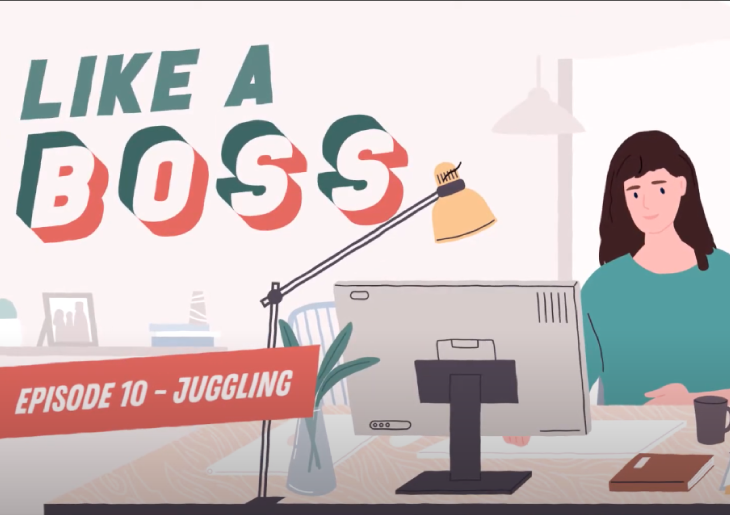
Hi Flinders fam. Guess what? It’s our last Like a Boss episode for the series! We’ve just about made it through the semester – amazing work everyone.
In our last topic, we’re going to talk about how to do the juggle. There’s more of you juggling study with children, grandchildren, full-time or part-time work, running small businesses, volunteering or caring for others than you might think. In fact, Flinders has a huge cohort of mature age students from a huge range of diverse backgrounds – the largest in the state.
In fact, the average Flinders student is mature-aged, female, and likely doing the juggle. However, it might not feel like this is the case.
Many of you face really unique issues, most of them far more complex than we can address in this video. But the main thing I want you to know is that Flinders sees you, you’re not alone, and supports do exist. Oasis are hosting an online Take a Break Conversation Group on Tuesdays and FUSA are planning a mature-age student collective for semester two. They’re going to have a forum to discover what you guys want out of it, so keep an eye out for that!
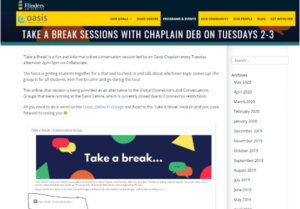
The complexity of the juggle also means that there’s no quick fix to many of the issues that come up and I’m not going to pretend like I can present you with solutions to problems that – to be honest – I don’t have much experience with. So instead, in this episode, it’s over to you guys. Here are tips for juggling study with other responsibilities from those who are doing the juggle.
I’d like to introduce you to Mousumi, Ali, Ros and Sideth – a mix of parents, grandparents, small-business owners, PhD students, and carers of those with complex needs, who each have their own version of the juggle. I hope their experiences can help those of you who are managing the juggle!
Mousumi Rakhi
Acknowledge the Difficulties
Hello everyone, my name is Mousumi Rakhu and I’m from Bangladesh. I am studying a Masters of Public Administration and Policy here at Flinders. I have two school-going kids, so you can understand my home situation! My home is always noisy, most of the time it is messy, it is not clean at all. I have to spend a lot of time cleaning but still it’s not clean!

Right now, the biggest challenge that I’m facing is definitely online classes because I’m not used to attending them. It was really difficult at the beginning because the situation was so critical. Like others, I was stressed about the situation, about the safety of my family and myself and, at the same time, my classes went online for the first time. I missed the face to face environment of the class. It was new. Everything was different.
At the same time, my kids were staying at home because I didn’t send them to school for a long time. They are always making noise, fighting with each other, and they were bored. They wanted to go to school, they wanted to go outside to play with other kids. So, it was really difficult for them also.
My younger one, sometimes she’s stubborn. Without any reason she starts crying, she starts shouting, and we can’t manage her. She doesn’t want to have breakfast, to go to the toilet, brush her teeth or clean herself.
At the time, it feels like, oh my God, I can’t do all this. I can’t manage my kids; I can’t send them to school. I’m the most awful person in the world, I’m the worst mother. It’s a really difficult situation I think that only mums can understand!
Be Flexible and Try to Keep Kids Engaged
It is not always possible to follow any routine or work according to a plan. What I try to do is keep my kids engaged in some activities. English is not our first language, so I ask them to watch English kids’ movies so they can develop their communication skills.
Also, sometimes I ask them to help me in my work, like to clean the house or help me in the kitchen. Sometimes I ask them to help their father while cleaning the car. I do so because I want them to develop a sense of duty or responsibility that will help them in the future.
Ali Onody
Hi I’m Ali, I’m a PhD student at Flinders University in the College of Psychology, Education and Social Work. I’m also the mum of two small children, a seven-year-old and a four-year-old, and I support my partner who works in a senior management position in quite a large company. We live about an hour away from campus. We’re also a family who live with autism. My partner is on the spectrum and my seven-year-old is also on the spectrum. So, the role I play in my family is sometimes the role of a carer.
I also have my own stuff going on. I have auto-immune disease and that changes the way I feel or function on most days which can also make things really hard sometimes. So my life is very full, it’s very colourful. It’s also really busy!
It can make being a student and meeting my student commitments and the expectations I set for myself really difficult.
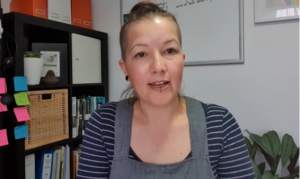
Know what you can and can’t control
Covid has been a challenge for the whole world, but it’s certainly been a challenge for our family. Living with autism, that change in rhythm and routine really derailed us for a little while there. Particularly for my daughter, transitioning her from school to home-schooling was really hard for her. She was distressed for quite some time: her anxiety was much worse; she was doing lots of compulsive behaviours, washing her hands so much she got sores on her hands; she wasn’t sleeping. And as her mum, that was really stressful for me too. I was also trying to study and home-school, my partner was working from home and everybody was home! There just weren’t enough hours in the day. I wasn’t able to do what I needed to do, but I also didn’t feel like I was able to be there for my family – for my children – in the way that they needed me to be.
I’m currently on a three-month intermission so I could have a bit of breathing room to do what I need to do. When I sent the application for the intermission in, I cried. I was really upset. It really did feel like a failure: I couldn’t do it. But of course, it wasn’t. On reflection now, I see that it has nothing to do with my capabilities. It wasn’t that I wasn’t smart enough or anything like that, I was just doing too much. In reality, the break was exactly what I needed and, in fact, it’s given me the opportunity to sit back and look at how I’m going to go forward and this use unplanned opportunity to recalibrate.
I’ve been a student for quite some time now, and if I look back on my journey there’s a few things that always seem to be the things that get me over and through those moments:
Be flexible
Being flexible and being prepared to change the plan and move with the challenges is really important. There’s no two years or two weeks that look the same so I can’t take the same approach every week, every year, every day. It just doesn’t work like that.
Ask for help when you need it
It’s important to ask for help when you need it, even if that means you need to take a break when no matter which way you slice it it’s just not possible to do what you need to do without cloning yourself.
Support networks and connections
If I think about the times when things have worked really well for me, it’s when I have really good support networks in place. My parents are really helpful for me, my partner is really supportive and helpful. Especially those connections with your peers and the faculty at uni, they help give me that sense of belonging so when I don’t feel like I belong and it’s hard and I’m attributing things to myself that I really shouldn’t be. That brings me back, connecting with my friends and feeling like I do belong here.
Don’t overcommit
I have to check myself on this all the time! There’s only so many balls you can juggle, so making sure that is manageable, cutting out the noise and saying no to things when it just gets too much.
Care for yourself
This is something that I also have to check myself on constantly, but I know that when I’m healthy and well-rested is when I function best. Eating well, sleeping well and also taking medication and the vitamins that I need to take.
Celebrate the successes
It gives you something to reflect on in those really difficult times if you can remember how it feels to succeed. Celebrate everything and anything that you can! From handing in an assignment to graduation, holding in a proposal draft to doing a presentation. Celebrate everything!
Find what works for you
It can be hard, sometimes it might seem impossible, but you can do it in the way that works for you. I think that’s really important. The way that works for you is the way that works for you.
Sideth
Block out specific times for study
Hi! I’m living in a family of three, my wife and my son. As a father, it’s quite challenging for me to focus on my study and take care of my family at the same time. However, I find it more useful when I block a specific time of the day for my study, and a time for taking care of my family.
My wife goes to work in the morning, so I have to make sure that breakfast is ready, take care of my son’s lunch box then drop him off at school. When I get home, I start studying usually between 10 and 3 o’clock. At 3 o’clock, I have to take my son home from school and start making dinner because my wife gets back from work around 6 o’clock.
It is a bit difficult, but it’s manageable. I’ve found that living here – you know, studying and having your family at the same time together – is very helpful. There’s a lot of support, especially mental support.
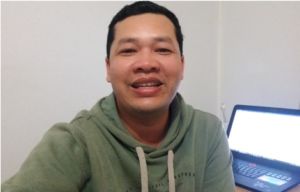
Ros Wong
I’m a PhD candidate in the college of Business, Government and Law at Flinders. I have four children, all grown up but still very demanding. I became a grandmother recently, so I have a six-week-old granddaughter. I run a small business in a regional town which unfortunately got hit with Covid restrictions, so I have numerous demands that were placed on me prior to Covid, and I think they’ve become more pressing as Covid restrictions have been enforced.
I never thought about how I structured my day when I first went into lockdown with Covid. I just used to bumble along and do whichever airplane I could land first.
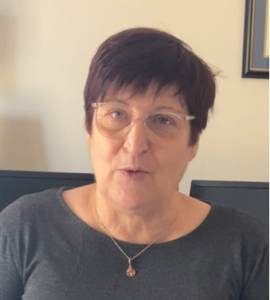
Structure your day
After a couple of weeks and it became more long-term, I had to do JobKeeper payments. For that I had to lodge a BASS statement, for that I had to do my tax, and that was snowballing out of control. I had to submit my thesis which was in the final stages, and I was co-authoring a paper, so the demands were becoming quite pressing. Suddenly, I got up one morning and thought, ‘I really need to do something’, so I decided to pull myself into gear.
I now get up at eight o’clock in the morning, I have my breakfast, work for two or three hours, have lunch, work another two or three hours. If I feel like it, I will work again after four until maybe six or seven. That’s how I structure my day. I make sure I get up at the same time every day.
Keep yourself accountable
I also make myself accountable. I tell my buddy who I’ve had since honours what I need to achieve for that day, or what I need to achieve for that week, and I make sure that she holds me accountable to that. There’s someone sitting on my left shoulder telling me you can’t just sit and watch TV at three o’clock in the afternoon – you need to do some work!
But I’m also kind to myself. If I feel like I’ve done enough for the day I switch off the computer, go for a walk with the dog, feed the galahs and hang out some washing.
Basically, structuring your day really helps and setting small goals.
Clara Santilli – Mature Age Student Officer
Hi I’m Clara Santilli, the Mature Age Student’s officer for FUSA. Apart from being frightening, mysterious and unknown, and giving you free snacks once a week, what do we do for you? My role is to represent students over 25-years-old. Why do students over 25 need a specific officer? For me, I came back to study my Masters degree at 30. I study part-time and I take one unit at a time, but I found my demands were very different to when I was in my twenties doing an Honours. It was a combination of life experience, energy levels, available resources. It’s a real different lifestyle.
Thinking about when I first started is a real hard place for me to go back to because I remember how isolated I was, how different campus looked, the fact that I had to contend with Flinders Learning Online, and I just didn’t know where I could go to meet people. I wasn’t into the clubs and societies because there was nothing that spoke to me beyond my academic discipline. For me, it was a question of, ‘how do I find my feet on campus?’
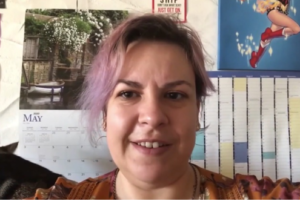
What’s Helped? Treating University Like a Job
I’m a huge fan of the Horizon Award, you’ve probably seen it around. It’s a service offered by Careers. It’s a free professional development program where you can do classes on things like workplace diversity, which is great if you’re a bit older; workplace communication, which has really helped me keep up with workplace culture; and conflict and negotiation, and I’ve used both of those in the past to take some of the pain out of being a student.
The reason I talk about the Horizon Award is one of the really cool things they said to me is to treat study as if it’s a professional environment. For me, that idea of treating university like a job has been really important in my not being afraid to reach out to services. Id a job, if you’re told to go and do X, Y and Z, but you don’t know how to do Y, you don’t just procrastinate and think, ‘I can’t do this’. You think, ‘this is my job, this is what I’m being paid to do’, and you go and find an expert. That’s what Horizon was for me, they’re some of the experts on campus. That’s so important – being able to reach out not just to your lecturers, but develop those enterprise skills, what we used to call soft skills, that help you negotiate the environment so much better.
Last Words
Thank you so much to everyone who shared their stories today. As we start to chart a path back to the ‘new normal’, things are going to keep changing and it’s important to remain flexible, open and ready to reach out when you need it.
Keep an eye out for updates from Clara about the mature age student collective. It sounds like they have some great ideas for next semester. And, of course, remember the support services that exist here at Flinders are for everyone: there’s Health and Counselling, Oasis, the Student Learning Support Service, and your College supports. We’re all in this together!
That’s it for this series of Like a Boss. A huge thank you to all the staff and students who have contributed over the semester and to the Like a Boss team working behind the scenes – Lydia, Nathan, Steph, Nick, Gareth, Verity and Melissa.
Links and resources
If you want to get in touch with Clara and find out more about her role as Mature Age Student Officer and her plans for semester two, you can reach her at matureage.officer@flinders.edu.au or check out the FUSA site.
For more about the Horizon Awards, check out the Horizon Award FLO page.
You can find more information about the Oasis Take a Break Conversation Group here.

